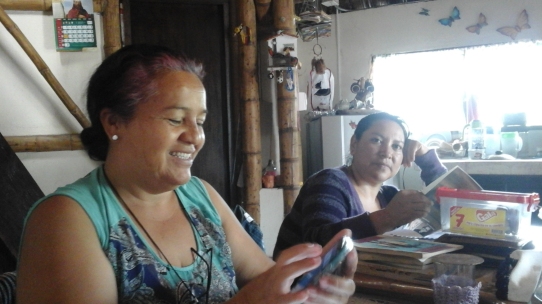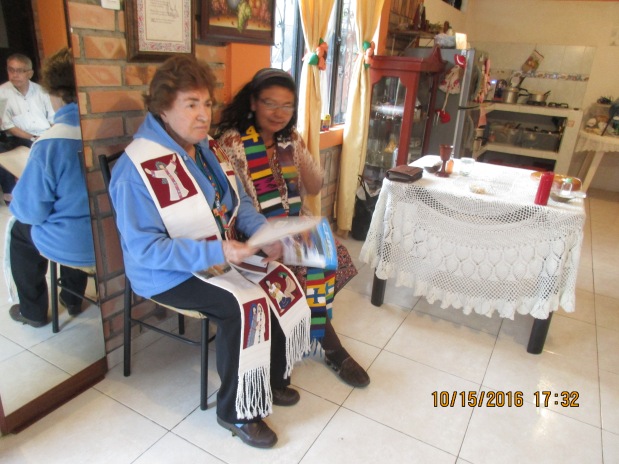https://evangelizadorasdelosapostoles.wordpress.com/2016/10/19/arcwp-apcr-asociacion-de-presbiteras-catolicas-romanas-vamos-de-prisa-anunciando-el-evangelio-olga-lucia-alvarez-benjumea-arcwp/
Mónica: Pero, si dicen que de la carrera no queda sino el cansancio?
…. Pues, ve, vos que opinas, si te llegan con alguien infartado, qué hacés?
Cecilia: No pues, ahí mismo me arremango a atenderle, no hay tiempo que perder.
…Pues, lo mismo nos esta pasando con el anuncio del Evangelio. Necesitamos que le llegue a muchos de nuestros hermanxs, antes de que sea tarde. En el Evangelio de ayer, reflexionábamos que la cosecha es abundante y los operarios muy pocos. (Lucas 10:2) Te acuerdas? Acaso, quienes cultivan café, no sienten en el momento de coger la cosecha, esa angustia de que ya no vienen trabajadores a ayudar a recogerla?,.Tu misma me comentabas las dificultades que han tenido en cada cosecha, además que en el campo, ya no van quedando sino personas mayores, porque los jóvenes quieren, salir a buscar un “futuro” mejor.
Lucero: Si, eso mismo se ve y he vivido en mi vereda.Con la gravedad de los males que se le esta haciendo a la Madre Tierra con el glifosato, las matas de plátano criollo que protegen el café, con ese elemento le entra un gusano en su raíz que acaba con ellas. Por eso se esta viendo cada vez más en el mercado, el plátano de exportación, de Urabá privilegiando de manera especial esa zona, y acabando con el pequeño caficultor, en el resto del país.
Juan: Eso que ha dicho Lucero, es cierto. Además, cada día se esta incrementando el monocultivo. Cuando la diversidad en el cultivo es una protección contra las plagas.
…No vemos en vano, como se ha ido fomentando, la violencia, contra aquellos lideres que quieren proteger la Madre Tierra.
Mónica: Ahora, estoy entiendo mucho más la labor nuestra en el ministerio!
Arturo: Es urgente, que nos preparemos para salir a anunciar el Evangelio. Uniendo cada vez más la Palabra de la Divinidad, con la acción.
…Si seguimos el Evangelio, con la sugerencia de Arturo. Esto nos hace recordar que el asesinato de Jesús, hasta el día de hoy ha sido un crimen que quedó impune, como muchos de los que conocemos. Se conocen los autores intelectuales, (Pilato-los Sumos Sacerdotes) los ejecutores, los “falsos positivos”=falsos testigos. La guerra psicológica, el pánico, (Pedro y sus amigos huyen), se gesta la persecución a los cristianos…
Cecilia: Contemplación-Acción. Van unidas, pero tenemos que tener cuidado, como dice el refrán popular: “ni tanto que queme al santo y ni tanto que no lo alumbre”.
…Me encanta ver el trabajo que se esta haciendo. Mucha cercanía con la gente, cada vez con olor a campo, a café, puro olor y sudor a ese amor a la Madre Tierra.
Les invitamos a ver en el material gráfico la experiencia que hemos vivido, que seguirá grabada en lo más profundo de cada unx. Una imagen dice más que mil palabras.
REPORTE GRÁFICO, POPAYÁN VEREDA JULUMBITO.

Una las principales calles de la Ciudad de Popayán,conocida como la Ciudad Universitaria, Religiosa. Gente encantadora,humilde y sencilla, nos revelan su identidad indígena. Por algo la sede de la ONIC (Org. Nal. Indígena de Colombia), se encuentra en Popayán-Cauca.

Vamos llegando a la Vereda Julumbito. Felices de encontrarnos. Han venido Mónica y Arturo del Ecuador para acompañarnos.

Una Maloca! Que linda! Aquí vive y trabaja Cecilia con su esposo, atienden a los pacientes y cuidan de la Madre Tierra. La Maloca es un diseño de casa indígena circular aunque no lo parezca. Todo el tiempo vivimos abrazadxs del signo de la Unidad.

Ya estamos en casa. Es increíble! Cocina-comedor-habitaciones-y atención a pacientes, abajo. Arriba esta el Oratorio, desde donde cubre toda la casa!

Juntxs hemos celebrado la Eucaristía.

Atendiendo a un paciente, tambien se celebra la Eucaristía. Cecilia lo atiende. En este espacio, hacen terapias, masajes, aplican inyecciones, y sobre todo el acompañamiento espiritual…
Cecilia a dónde vas? A visitar a Raúl y a Rogelia.

Creo que sola no te vas. Nos cambiamos y nos disponemos a ir a a celebrar la Eucaristía en casa de la Señora Rogelia y Don Raúl.

Preside la Eucaristía,Lucero. Le acompañamos la pareja, Arturo, Mónica, Juan, Cecilia y yo.
En este hogar, hemos compartido la Palabra de la Divinidad y la Eucaristía. En la Homilia que fue compartida, dimos a conocer la historia de nuestros ministerios. Ellxs libremente, nos hicieron preguntas que ya una u otra respondíamos. Ellxs nos dieron la comunión, y ellos como pareja, fue lindo verlos compartir la Eucaristía: la esposa, se la da al esposo. El esposo se la da a la esposa. Fueron ellos lo que nos la dieron, porque ellos, en la casa, en la vereda, en su trabajo, son testimonio y han formado a sus hijas, en la fe y en los valores cristianos.

Regresamos a casa. Pues Arturo, no nos dejaba un minuto libre. Y muchas cosas nos faltaba conversar todavía.
Nos preguntábamos acerca de la Historia del ministerio sacerdotal de la mujer en la Iglesia. Comentamos el Canon 1024, el Decreto Graciano 1.140 (las mujeres deben llevar cubierta la cabeza, porque no son la imagen de Dios…) y el sexismo en general de la Iglesia institucional.
Comentamos que sin salirnos de la Iglesia, aqui estábamos anunciando el Evangelio, pues amamos la Iglesia, no hemos renunciado a Ella, no aceptamos por ningún motivo el que se nos arrebaten la fuerza de nuestro Bautismo!
Vamos de prisa a llevar el mensaje que Jesús le dio a Maria de Magdala:Juan 20:1-18, pues muchxs, no se han enterado de ello todavía.
Ella lo busco, lo encontró, lo descubrió, lo conoció
y su vida, se transformó
Nuestra tarea: No vamos a parar de anunciar el Evangelio, y así lo hicimos todo el tiempo que estuvimos en esa querida ciudad de Popayán-Cauca, cargada de historia ancestral!
Nuestros agradecimientos a la Esencia Divina, por su Presencia en medio de nosotras/os. A Cecilia, a su esposo, por su acogida, fraterna, su generosidad.




















